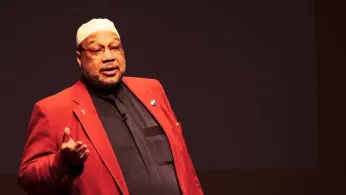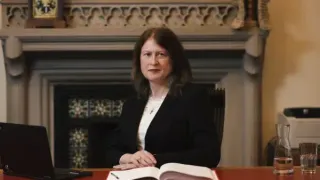
Aug 19
Daayiee Abdullah, America’s First Black Gay Imam, Remembered for Legacy of Courage and Inclusion
READ TIME: 3 MIN.
Daayiee Abdullah, widely recognized as the first openly Black gay imam in the United States, passed away on August 3, 2025, in Bogotá, Colombia, at the age of 71. The news was confirmed by the Mecca Institute, the not-for-profit organization he founded to promote progressive Islamic theology. In their announcement, the Institute described Abdullah as a “trailblazer of human rights and the first openly gay imam in the United States,” noting the profound impact he had on communities around the world .
Messages of grief and remembrance have poured in from the LGBTQ+ community and beyond. Many described Abdullah as “kind,” “gentle,” and “courageous,” reflecting on his unwavering commitment to justice and inclusion. “He was so kind and I’m in disbelief. Thank you so much for your presence, imam Daayiee,” one mourner wrote. Another recalled, “He gave so much love, wisdom and light to those around him…his memory will continue to inspire many hearts” .
Abdullah’s journey into religious leadership was marked by both adversity and resilience. He began his formal Islamic studies in Virginia at the Graduate School of Islamic Social Sciences in 2000, determined to deepen his understanding of the faith. Despite being expelled before completing his master’s degree due to his openness about his sexual orientation, Abdullah remained committed to his mission. He went on to serve as imam in the United States, Europe, Norway, the Netherlands, and the UK, breaking barriers and challenging exclusion within Islamic communities .
As a scholar and educator, Abdullah lectured internationally on progressive Muslim concepts, interfaith networking, and inclusive interpretations of Islamic law. His mosque in Washington, D.C.—Masjid el-Tawhid An-Nur Al-Isslaah—was intentionally inclusive, welcoming all genders, sexualities, and faiths, and serving as a model for progressive Muslim worship .
Abdullah’s activism extended far beyond the pulpit. He performed marriages, funerals, and provided counseling for LGBTQ+ Muslims and others who found themselves marginalized by traditional religious communities. By 2015, he had officiated more than 65 marriages, including same-sex and interfaith unions, always rooted in his belief that faith should be a source of love and acceptance, not exclusion .
Abdullah played key roles in organizations such as Muslims for Progressive Values, serving as an advisory board member and co-leader of the D.C. chapter. He also moderated the Muslim Gay Men Discussion group for over a decade, helping others reconcile faith and sexuality. His leadership was instrumental in the development of the Muslim Alliance for Sexual and Gender Diversity, and he contributed to the planning of the annual LGBT Muslim Retreat .
In interviews, Abdullah spoke candidly about the challenges he faced, including homophobia, Islamophobia, and racism. “As an intelligent Black man in America, I’m an endangered species. And then to be Muslim upon that and then to be a social justice warrior and someone who’s innovative to bring new change…all those things I find much bigger than just the idea of, of homophobia,” he reflected .
Daayiee Abdullah’s influence is felt across generations of LGBTQ+ Muslims and allies. This year, the Mecca Institute announced that Abdullah had been awarded the 2025 Creating Change Award by the National LGBTQ Task Force, a recognition of his decades-long commitment to justice, education, and reform in religious spaces .
His passing has prompted reflection on the power of visibility and leadership. For many, Abdullah’s life is a testament to the possibility of living authentically within faith traditions, and to building communities that honor and celebrate diversity. “Imam Daayiee Abdullah’s advocacy for inclusivity and his courage to challenge norms is truly remarkable. A powerful story of faith, equality, and acceptance,” wrote one admirer .
In the wake of his death, LGBTQ+ Muslims and progressive faith leaders continue to draw inspiration from Abdullah’s teachings and example. The Mecca Institute and allied organizations remain dedicated to the work he began, advancing the cause of equality and spiritual affirmation for all.
As the world mourns the loss of a pioneering imam, his legacy endures in every life he touched and every community he helped build—a legacy rooted in courage, compassion, and unwavering faith in the dignity of all people.






